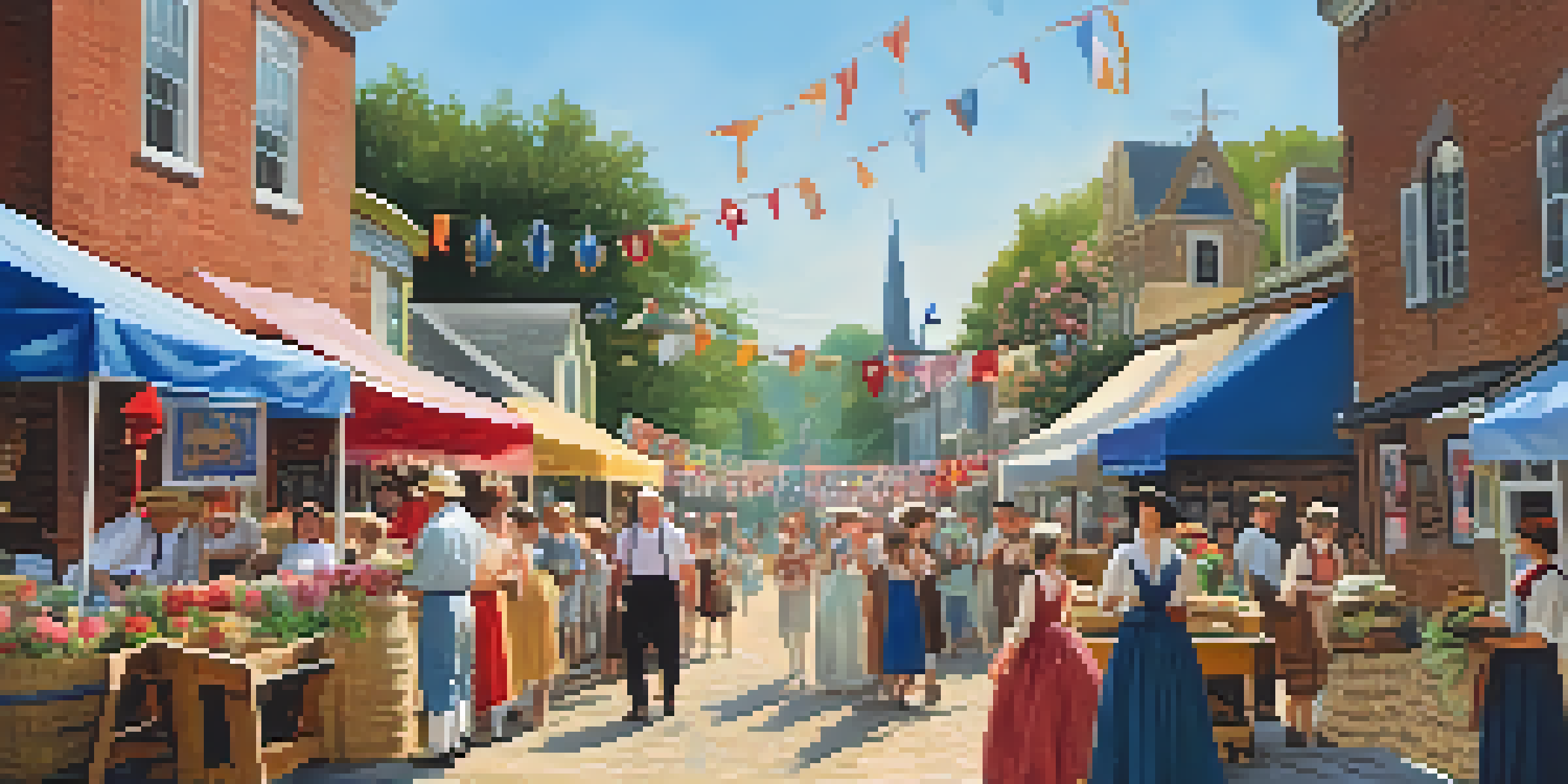Historic Sites in North Carolina: A Journey Through Time

Uncovering the Birthplace of North Carolina: Roanoke Island
Roanoke Island is often called the site of the first English colony in America, which mysteriously disappeared in the late 1500s. It’s a place steeped in intrigue, where the stories of early settlers come alive. At the Roanoke Island Festival Park, visitors can explore replicas of the original ships and learn about life in the 16th century.
History is not a burden on the memory but an illumination of the soul.
The island is not just about history; it’s also a beautiful spot for nature lovers. The surrounding waters and wetlands are home to diverse wildlife, making it a perfect destination for outdoor activities. Imagine strolling along the waterfront, with the scent of salt in the air and the sounds of nature all around you.
Roanoke Island serves as a reminder of the challenges and triumphs faced by early American settlers. As you walk through the park, you can almost hear the echoes of their hopes and dreams, making it a deeply moving experience for anyone interested in history.
Exploring the Historic Charm of Bath, North Carolina
Bath, North Carolina’s oldest town, offers a charming glimpse into the past with its well-preserved historic buildings. This quaint town was once a bustling port and is now a peaceful escape for history buffs. As you wander the streets, you’ll encounter sites like the historic Bonner House, which dates back to the 18th century.

Visiting Bath feels like stepping back in time, with its picturesque waterfront and friendly locals. The town hosts various events throughout the year, allowing visitors to experience traditional crafts and local culture firsthand. Picture yourself enjoying a local festival, with music and food that celebrate Bath’s rich heritage.
Roanoke Island's Historical Mystique
Roanoke Island is renowned for being the site of the first English colony in America, inviting visitors to explore its rich history and natural beauty.
Bath’s significance in early American history is undeniable, as it played a vital role in the state’s development. By exploring its streets, you can appreciate how this small town contributed to the larger narrative of North Carolina's history.
Step Back in Time at Historic Edenton: A Colonial Gem
Edenton, once the capital of colonial North Carolina, is a town that beautifully preserves its historical charm. With its stunning waterfront and historic homes, Edenton invites visitors to explore its rich past. A stroll down Broad Street reveals beautifully restored buildings, each with its own story to tell.
The past is never dead. It's not even past.
One of the must-visit sites is the Cupola House, a striking example of 18th-century architecture. As you tour this historic home, you can imagine the lives of the families who once lived there, hosting gatherings and making important decisions that shaped the colony. The attention to detail in the restoration allows visitors to truly connect with history.
Edenton also played a pivotal role during the American Revolution, making it a fascinating stop for those interested in the nation's founding. The town’s historical significance, combined with its scenic beauty, makes it a perfect day trip for anyone looking to dive into North Carolina's colonial past.
The Revolutionary War Era: Fort Macon State Park
Fort Macon State Park is a remarkable site that offers a glimpse into North Carolina’s military history during the Civil War. Located on Bogue Banks, this historic fort is well-preserved and serves as a reminder of the state’s strategic importance. Exploring the fort’s walls and tunnels transports you to a time of conflict and resilience.
Visitors can enjoy guided tours that provide insights into the fort's construction and its role in various military engagements. Imagine standing on the ramparts, looking out at the Atlantic Ocean, and feeling the weight of history surrounding you. It’s a place where stories of bravery and sacrifice come to life.
Wilmington's Cultural Heritage
Wilmington's vibrant cityscape features antebellum architecture and significant historical sites, including the Battleship North Carolina, showcasing its role in American history.
Beyond its historical significance, Fort Macon also offers stunning views and recreational opportunities. Whether you’re hiking along the beach or picnicking in the park, it’s easy to see why this site is a favorite among both history enthusiasts and nature lovers alike.
The Enchanting History of Old Salem: A Moravian Community
Old Salem is a living history museum that showcases the unique Moravian culture in North Carolina. This charming settlement, founded in the 18th century, is filled with beautifully restored buildings and interactive exhibits. Walking through Old Salem feels like stepping into a different world, where traditions are preserved and stories are shared.
Visitors can explore the various shops and homes, learning about the crafts and trades that defined the Moravian way of life. Imagine watching artisans at work, creating pottery or baking traditional Moravian cookies right before your eyes. It’s an immersive experience that delights all senses.
Old Salem also hosts seasonal events that highlight its festive heritage, bringing the community together to celebrate. Whether you’re interested in history, culture, or simply enjoying a beautiful day, Old Salem offers something for everyone.
Discovering the Historic Significance of Wilmington
Wilmington is a vibrant city rich in history and culture, making it a must-visit destination in North Carolina. Once a major port city, Wilmington played a crucial role during the Civil War. Today, its historic district features antebellum architecture and charming streets that invite exploration.
One of the highlights of Wilmington is the Battleship North Carolina, a memorial to the brave sailors who served during World War II. Touring the battleship allows visitors to step aboard and gain insights into naval history. You can almost feel the spirit of those who fought for freedom as you walk the decks.
Greensboro's Civil Rights Legacy
Greensboro is a pivotal location in the Civil Rights Movement, highlighted by the Woolworth's sit-in, offering a powerful educational experience at the International Civil Rights Center & Museum.
Wilmington’s historical significance extends beyond military history, with numerous museums and galleries showcasing its diverse past. From the Cape Fear Museum to the historic homes along the Riverwalk, there’s no shortage of opportunities to learn and appreciate the layers of Wilmington’s history.
The Legacy of the Civil Rights Movement in Greensboro
Greensboro holds a significant place in the history of the Civil Rights Movement, particularly with the Woolworth's sit-in of 1960. This pivotal event marked a turning point in the fight for racial equality in the United States. The site of the sit-in has been transformed into the International Civil Rights Center & Museum, where visitors can learn about the struggle for civil rights.
Inside the museum, you’ll find exhibits that detail the events leading up to the sit-in and the impact it had on the nation. It’s a powerful experience that encourages reflection and dialogue about social justice. Walking through the museum, you can feel the weight of history and the resilience of those who fought for change.

Greensboro’s commitment to remembering its civil rights legacy is evident in various community events and educational programs. By visiting, you not only honor the past but also contribute to ongoing conversations about equality and justice for all.
Cherishing the Legacy of Historic Hillsborough
Hillsborough is a hidden gem, rich in history and character. This small town played a significant role in the early political landscape of North Carolina, serving as a meeting point for many revolutionary leaders. Walking through the town, you can see historic buildings that date back to the 18th century, each with its own unique story.
One of the highlights of Hillsborough is the Historic Orange County Courthouse, where many important decisions were made during the colonial period. Today, it stands as a testament to the town's vibrant past. Imagine attending a local event in this historic setting, surrounded by the charm of old-world architecture.
Hillsborough also embraces its history through various cultural events, including festivals and reenactments. It’s a place where the community comes together to celebrate its heritage, making it an inviting stop for anyone interested in experiencing North Carolina's rich history.